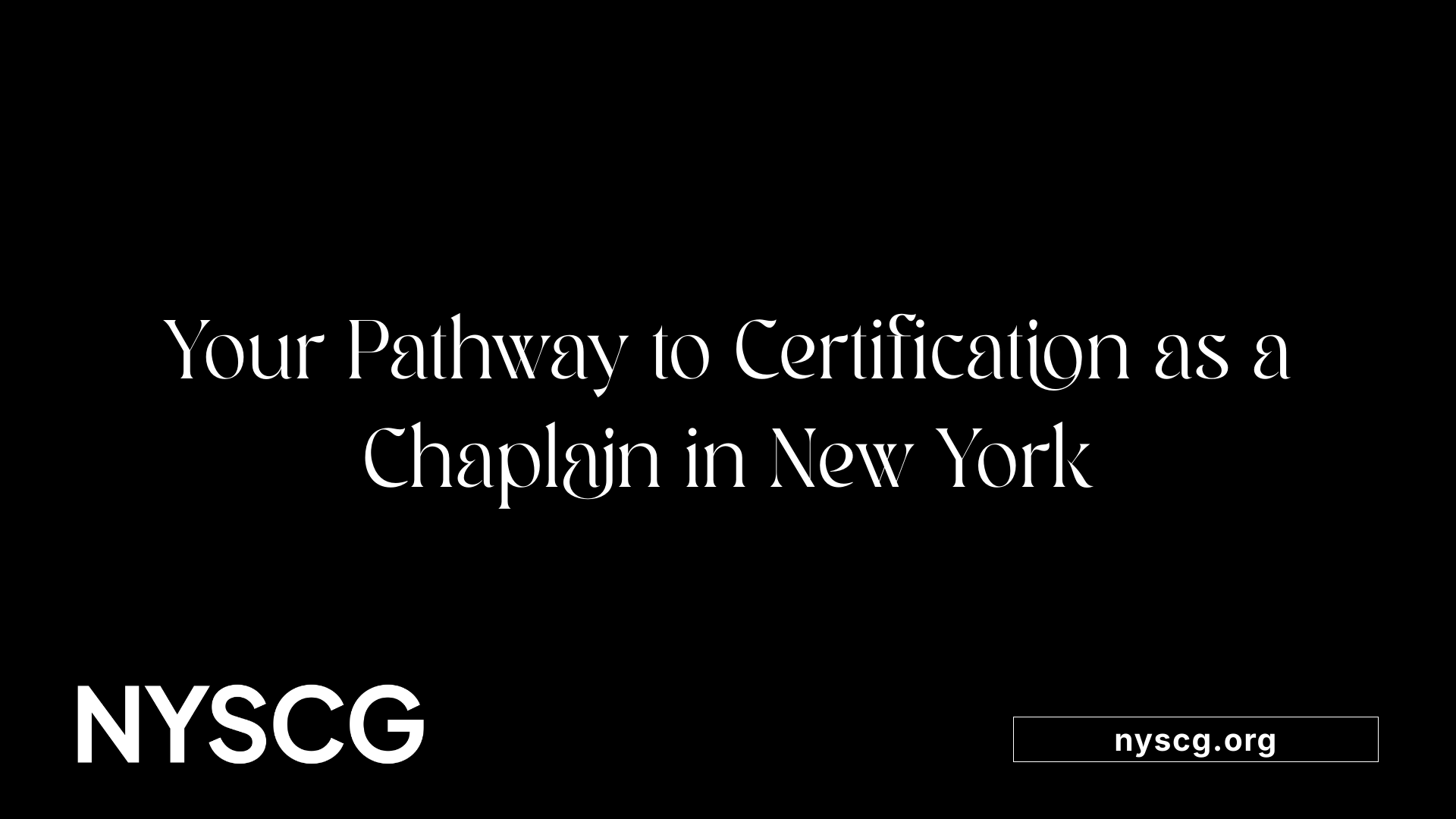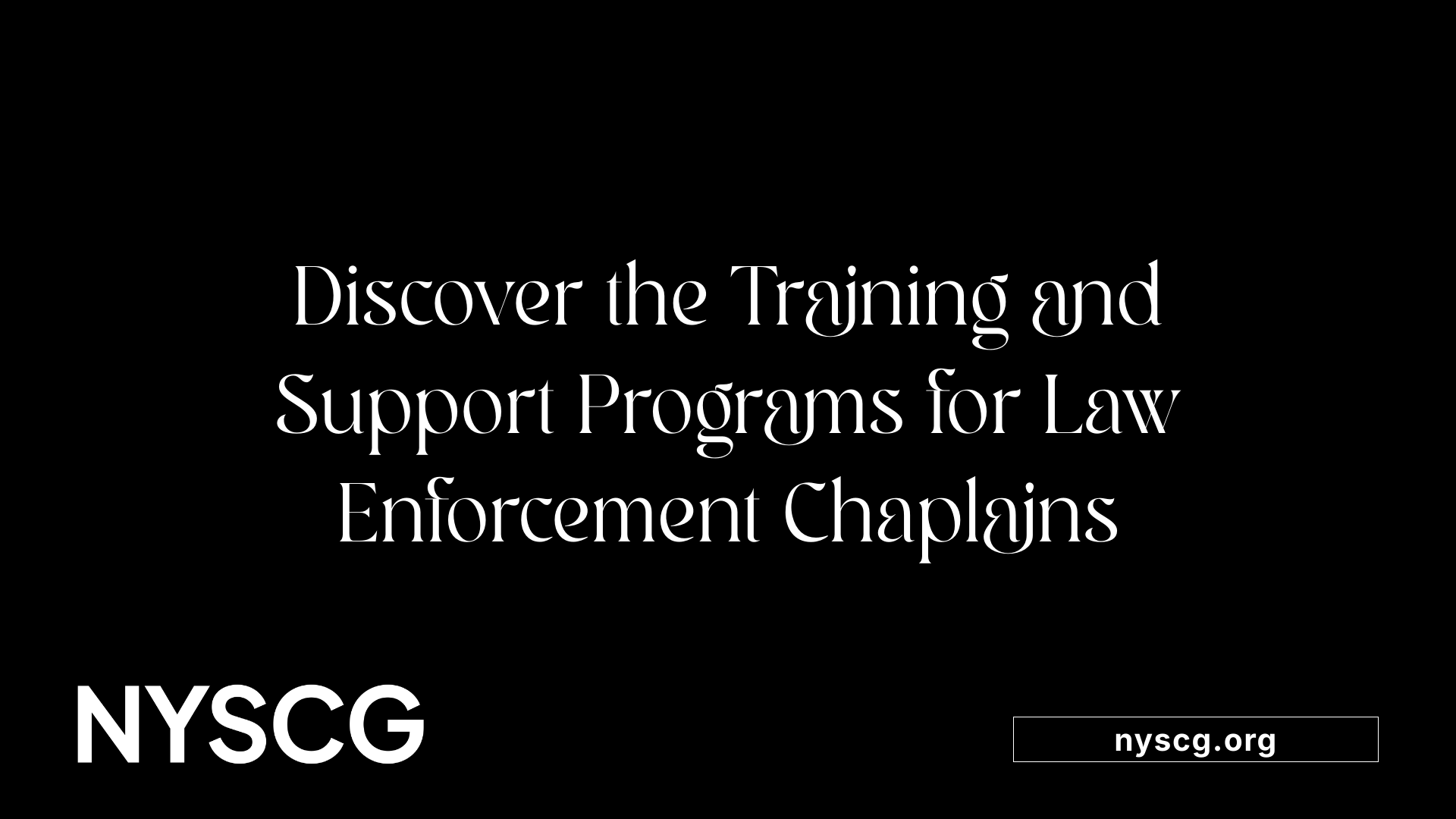How to Work with the NYPD as a Certified Chaplain


In a city as vibrant and complex as New York, the role of a chaplain within the NYPD exemplifies a vital partnership between spiritual care and law enforcement. This article outlines the pathways, requirements, and responsibilities for those aspiring to serve as a certified chaplain working with the NYPD, emphasizing the importance of proper certification, training, and ongoing support.

To become a chaplain in New York, individuals typically need a relevant bachelor's degree and a master's degree in theology, ministry, or a related field, totaling at least 48-72 semester hours. Completing Clinical Pastoral Education (CPE), usually four units from accredited programs like ACPE, is essential. Candidates also need to accumulate at least 2,000 hours of professional ministry experience. Demonstrating competence through interviews and submitted materials, along with endorsement from a faith group, is part of the process.
While ordination isn't always required, certain settings like the military may require full ordination or endorsement for specific roles. Certification pathways are provided by organizations such as the Association of Professional Chaplains, which evaluate skills, knowledge, and experience.
Applicants should contact The Rev. Jim Ketcham, the Chaplaincy Certification Coordinator, via email or phone to begin their application. They must meet set eligibility criteria, including faith endorsement and education requirements. After submitting an application and passing initial eligibility checks, the candidate’s case is reviewed by the certification committee.
Once approved, the candidate’s name is forwarded to the relevant state agency. The agency then conducts interviews as positions become available, facilitating the candidate’s placement in state institutions.
The certification process in New York is overseen by the state’s organization that supports chaplains working in various institutions such as the Department of Corrections, Office of Children and Family Services, and Office of Mental Health. Standards include educational requirements, clinical experience, and denominational endorsement.
Organizations like the American Council for Accredited Pastoral Education (ACPE) set the standards for CPE programs, which are a staple component of chaplain training. These programs are offered at multiple hospitals and institutions across New York, ensuring uniform quality and accreditation.
CPE is a crucial part of the certification pathway. It involves supervised clinical training that enhances pastoral skills, emotional intelligence, and crisis intervention. NYP, for instance, offers ACPE-certified CPE programs, including full-time residencies and part-time internships, at various hospital locations.
These programs focus on developing competencies like active listening, empathy, and spiritual assessment, preparing chaplains for diverse and challenging environments.
Candidates must demonstrate extensive pastoral experience, often through volunteer work or ministry leadership roles. Endorsement or recognition from their faith group confirms their standing within their religious community.
In summary, becoming a certified chaplain in New York involves a comprehensive process, emphasizing education, practical training, experience, endorsement, and ongoing professional development. Support from organizations such as the New York State Council of Churches and ACPE ensures chaplains are well-trained to serve in various institutional settings, supporting the spiritual and emotional needs of diverse populations.

Training programs for law enforcement chaplains are comprehensive and focus on preparing them to handle a wide range of situations they may encounter on the job. These programs usually include courses on crisis response, death notification, ethics, confidentiality, and building effective relationships with officers and the community. Organizations like the Billy Graham Evangelistic Association and the USCC Chaplain Academy offer specialized training, which can be both in-person and online.
Chaplains often complete coursework in psychological first aid, disaster spiritual care, and critical incident stress management. Certification pathways, such as those offered by ALEC, feature Basic and Advanced levels that require core classes, elective courses, FEMA incident management training, and continuous education to maintain their credentials.
Support for these chaplains extends beyond initial training. They benefit from ongoing education, peer networks, community engagement opportunities, and access to counseling and family support services. Certification renewal and program development are integral to maintaining high standards.
To ensure effectiveness, police chaplain sections help develop programs, facilitate resource sharing, and promote best practices. This ongoing support enables chaplains to serve both law enforcement agencies and the community efficiently.
Becoming a certified chaplain to serve with the NYPD involves a comprehensive process of education, certification, and training. It requires dedication to spiritual and emotional support, adherence to ethical standards, and ongoing professional development. With the proper credentials and a commitment to service, chaplains play a crucial role in fostering healing, trust, and resilience within law enforcement and the communities they serve. Their contributions are invaluable in strengthening the bonds of compassion and understanding amid the challenges faced by police officers and the public alike.
All you need is the will to make the world a better place.
New York State chaplain group inc. is a tax deductible organization with a federal tax Id number 92-383-4921